Interfaith
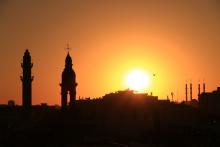
IN FALL 1884, the congregation that became Temple Israel opened its doors as the first Jewish synagogue in the state of Nebraska. From its inception, Temple Israel was a Reform congregation, a theologically progressive denomination that stresses the social justice imperatives of Judaism. Yet the early members of Temple Israel included not just Reform Jews, but Conservative and Orthodox Jews as well; navigating these interdenominational relationships would prove to be a significant part of the congregation’s early development.
Fast forward 130 years and Temple Israel is one of three houses of worship embarking on a unique interfaith partnership: a single campus in west Omaha that will house a Jewish synagogue, a Muslim mosque, a Christian church, and a fourth building for interfaith fellowship.
Aryeh Azriel, Temple Israel’s senior rabbi, planted the seeds for this project, known as the Tri-Faith Initiative, in 2006 when he reached out to the American Muslim Institute, another local religious community that was looking to construct a new building.
“The original idea started as a result of looking for a partnership in sharing parking lots,” Azriel told Sojourners.
The two communities had forged a relationship in 2001 when, following the Sept. 11 attacks, Azriel led members of Temple Israel in encircling a local mosque to protect it from the Islamophobic attacks they were seeing in the national news.
Syed Mohiuddin, president of the American Muslim Institute, agreed to the partnership; he liked the idea of the two religious groups sharing a parking lot with each other rather than with retail stores or other commercial development. However, it didn’t take long for the two communities to realize the project had greater potential than a shared parking lot. If they could find Christians willing to join them, they could build a shared campus for all three Abrahamic faiths, the first such campus in the world—at least to their knowledge.
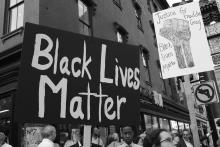
In the last year, the group has met with civic leaders, including four mayoral candidates, police commissioner Kevin Davis, and the governor’s Justice Reinvestment Coordinating Council, the council tasked with crafting a plan to reduce the prison population in Baltimore. Several leaders, including Archbishop Lori, went to West Baltimore following the protests to help clean up and lead services. Imam Earl El-Amin of the Muslim Community Cultural Center of Baltimore said several members had developed a relationship with a seniors’ building during the uprising, sharing medicines and food. Rev. Deckenback’s church has been accepting donations over the last year for areas impacted by protests.
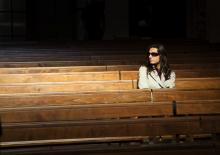
It’s 2016, yet patriarchy is alive and well across faith traditions.
Welcome to this special conversation with Jewish, Christian, and Muslim women on the unique challenges and opportunities of women’s religious leadership.
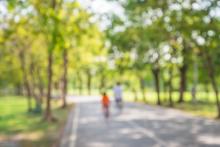
WHEN IT IS prayer time, Rami Nashashibi prays. His Muslim faith is the core of his life and work, inspiring the two decades of advocacy he has done on behalf of the poor and marginalized on the South Side of Chicago.
But when prayer time arrived on an unseasonably warm day in December, Nashashibi paused. It was just days after the terrible terrorist attack in San Bernardino, where extremists calling themselves Muslims murdered 14 people and injured many more. Nashashibi was in his neighborhood park with his three kids, and he found himself suddenly struck by fear at the thought of praying in public and therefore being openly identified as Muslim at a time when so many equated that term with terrorist.
That neighborhood park happened to be Marquette Park. Fifty years earlier another man of faith stood not far from where Nashashibi was standing, and he too felt fear. That man was Martin Luther King Jr. He had come to Chicago in 1966 to raise awareness about discriminatory housing practices on the South Side. His march through Marquette Park was met with racist sneers and vigilante violence. A brick thrown his way actually hit him in the head and brought him to his knees.

Akko is an ancient city, crusting the northern shore of the Mediterranean. The founder of the Bahá'í faith, Bahá'u'lláh, was exiled here in 1868, a prisoner of the Ottoman Empire. He was banished from his native Persia for declaring a new religion. He also established the absolute equality of women and men.
In the lives of early Bahá'í women, a powerful stance of love and service exists. These women were educators, journalists, mothers, and artists from both privileged and humble backgrounds. But a certain ardor — an eager flame — binds their stories together.
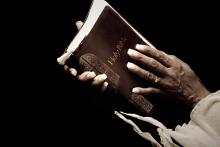
I am many things – a feminist theologian, staff member at the Interfaith Youth Core, an active member of a United Methodist Church, an activist, and a mother in a transracial adoptive family. These roles are linked and each informs the other — I try to be accountable to multiple communities and am shaped by a myriad of contexts.
As such, I look up to and learn from women who model interconnected lives, are shaped by the wisdom of many spaces, and work for liberation of both themselves and communities of women.
Mercy Amba Oduyoye , mother of African feminist theology, is one of these inspiring models.

Hindus around the world are wondering whether Sri Srinivasan — the name atop many a list of potential U.S. Supreme Court nominees — will be the first Hindu to serve on the high court. The India-born Srinivasan put his hand on the Hindu holy book, the Bhagavad Gita, held by his mother, when he was sworn in to the U.S. Court of Appeals for the District of Columbia Circuit in 2013. The Senate had confirmed him to the court — often a launching pad to the Supreme Court — by a 97-0 vote.
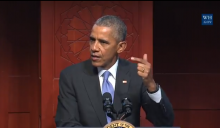
In times of rising Islamophobia, President Obama made a plea for religious tolerance at the first visit to an American mosque of his presidency. A lot of Americans have never been to a mosque, the president said as he began his speech, shoeless per Muslim tradition, in the Islamic Center of Baltimore’s prayer hall on Jan. 3.
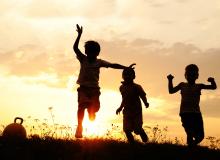
IT IS A SAD truth that presidential election seasons widen our divisions. The candidates seem to view veering toward the extremes as a mark of “patriotism.” That ethic gets reflected in our broader political discourse.
This is dangerous stuff in a diverse democracy. The heart of the American idea is that different groups can advance divergent interests and still collectively see themselves as one people. Princeton philosopher Jeffrey Stout puts it this way: “[Democracy] takes for granted that reasonable people will differ in their conceptions of piety, in their grounds for hope, in their ultimate concerns, and in their speculations about salvation. Yet it holds that people who differ on such matters can still exchange reasons with one another intelligibly, cooperate in crafting political arrangements that promote justice and decency in their relations with one another, and do both of these things without compromising their integrity.”
He calls this process of relating across differences building a “civic nation.” In the pursuit of that high value, here is a personal story of building relationships across deep religious differences.
MY WIFE’S PARENTS are moderately observant Muslims. For many years, they lived in a Chicago suburb next to an evangelical Christian family who homeschooled their three girls. At first, the two families were pleasant to each other but had little contact. Things changed when, one year when my wife and I were visiting for Eid prayers, the girls next door poked their heads over the wooden fence and invited our boys to come over and play. Our boys whooped happily and went.
This of course meant all of us adults trooped across the driveway and properly introduced ourselves to the neighbors. We collectively overheard a fascinating interfaith conversation in the backyard, our oldest son Zayd explaining that he got out of school today to celebrate Eid, a holiday that Muslims believe in because we believe in the Prophet Muhammad and the Quran. The neighbor’s oldest daughter responded that they go to school at home so they can follow a Christian curriculum because they believe in Jesus and the Bible. We adults shifted uncomfortably as we listened, knowing full well the doctrinal issues at stake. “Looks like someone learned something in religion class this week,” somebody commented, allowing nervous laughter to break out.
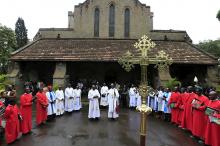
A Muslim man who shielded Christians after a passenger bus was ambushed by suspected al-Shabab militants is being saluted as a symbol of unity. Salah Farah, a schoolteacher, died Jan.18 in Nairobi, where he was airlifted after being shot in the arm and hip when he resisted militant demands that he identify Christians on the bus during the December attack.
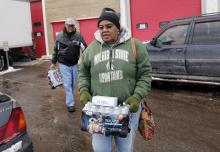
Catholic Charities is giving out water and food. The Flint Jewish Federation is collecting water and water filters. And the Michigan Muslim Community Council has distributed more than 120,000 bottles of clean water for Flint, Mich. But these faith organizations are also focused on a longer-term goal: to make sure the impoverished city, where President Obama last weekend declared a state of emergency over its poisoned water, is never so neglected again.
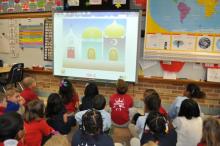
Opponents of lessons on Islam often claim that Christianity takes a back seat in public schools’ religious instruction. That’s what an Augusta County, Va., mother argued recently when she opposed a teacher’s use of the Muslim statement of belief in a calligraphy exercise. She held a forum at a local church to protest how her religion wasn’t allowed in schools, but Islam was.

Christian leaders have hailed as an act of bravery and selflessness the shielding of some Christians by Muslims after suspected al-Shabab gunmen in Mandera County ambushed a passenger bus.
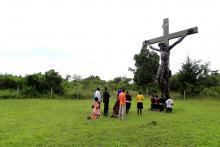
Francis marked the start of the jubilee on Dec. 8, when he opened the Holy Door at St. Peter’s Basilica in Rome. The yearlong celebration calls on Catholics to reflect on the theme of mercy and forgiveness and showcase a more inviting faith. That theme resonates in Africa, home to about 200 million Catholics. A sizable part of this population is tormented by war, violence from Muslim extremists, HIV/AIDS, and poverty.
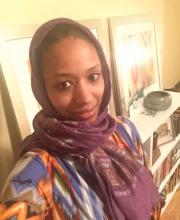
Wheaton College in Illinois announced on Tuesday that they had put Hawkins on administrative leave for her “same God” comments. In an official statement, college administrators expressed concern over the “theological implications” of her statements and promising a full review.
Founded in 1860, Wheaton has long been considered a fairly open-minded institution within evangelicalism. Science professors can teach evolution, government professors need not support conservative political theories, and students don’t have to worry about strict dress codes or stringent curfews like students at more fundamentalist colleges. In 2003, it eased bans on alcohol consumption and dancing.
But a string of politically charged events, culminating in Hawkins’ suspension, place Wheaton at an important crossroads. The school must now decide what kind of evangelical college they wish to be.
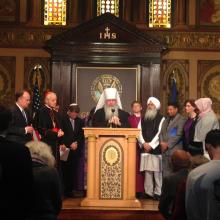
Vice President Joe Biden stood with clerics from different religions at Georgetown University on Dec. 16 and condemned the anti-Muslim rhetoric that has followed the recent shootings in Paris and San Bernardino, Calif.
“Look around. This is America,” Biden said, as he spoke on a stage with clergy wearing garb that varied from a priestly collar to a turban, and acknowledged the discomfort felt by many.
The vice president referred to the civil war in Syria and the millions of struggling refugees that some have said should be turned away.

Larycia Hawkins, a tenured professor at Wheaton College, pledged on Dec. 10 to wear hijab during Advent as a show of support to her Muslim neighbors.
"I don't love my Muslim neighbor because s/he is American," Hawkins wrote in a Facebook post.
"I love my Muslim neighbor because s/he deserves love by virtue of her/his human dignity."
"I stand in religious solidarity with Muslims because they, like me, a Christian, are people of the book. And as Pope Francis stated last week, we worship the same God."

Following a surge of attacks on mosques and Muslims — a backlash against recent extremist attacks in Paris and San Bernardino — Islamic leaders have been installing more security cameras and hiring more security guards. But as they worry about the physical safety of their flocks, they are also paying attention to the spiritual damage Islamophobia can inflict.
Hate crimes penetrate Muslims deeply and widely, said Kameelah Rashad, Muslim chaplain at the University of Pennsylvania.
“It erodes their sense of identity and their sense of their spiritual selves,” she said.

The Vatican has said that Catholics should witness to their faith but not undertake organized efforts to convert Jews, a significant step forward in the once tense relations between the two faiths.
The document released on Dec. 10 by the Vatican’s Commission for Religious Relations With the Jews also pushed for greater efforts to fight anti-Semitism.
In its most explicit commentary on evangelization regarding Jews, the document said Catholics should take a different approach to Judaism than to other religions.
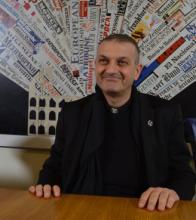
A Syrian priest held hostage for months by the ISIS terrorist group is certain his life was saved due to his interfaith work, despite being threatened with beheading by jihadists if he did not renounce Christianity.
The Rev. Jacques Mourad, a Syriac Catholic priest, was taken hostage in May from the Mar Moussa monastery, situated between the capital Damascus and the city of Homs. He and a volunteer from the monastery were forced into a car and driven for four days, during which time Mourad said he thought he would be killed.
“We could only perceive the sense of the desert. In that moment … I thought it was over,” he told members of Rome’s Foreign Press Association on Dec. 10, the first time he has spoken in detail about his odyssey since he escaped.